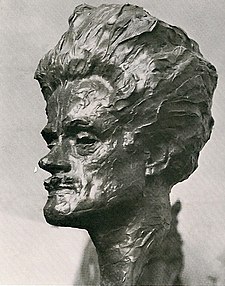Portal:Scotland/Selected biographies/77

Christopher Murray Grieve (11 August 1892 – 9 September 1978), best known by his pen name Hugh MacDiarmid (/məkˈdɜːrmɪd/ mək-DUR-mid, Scots: [ˈhju məkˈdjɑrmɪd]), was a Scottish poet, journalist, essayist and political figure. He is considered one of the principal forces behind the Scottish Renaissance and has had a lasting impact on Scottish culture and politics. He was a founding member of the National Party of Scotland in 1928 but left in 1933 due to his Marxist–Leninist views. He joined the Communist Party of Great Britain the following year only to be expelled in 1938 for his nationalist sympathies. He would subsequently stand as a parliamentary candidate for both the Scottish National Party (1945) and Communist Party of Great Britain (1964).
Grieve's earliest work, including Annals of the Five Senses, was written in English, but he is best known for his use of "synthetic Scots", a literary version of the Scots language that he himself developed. From the early 1930s onwards MacDiarmid made greater use of English, sometimes a "synthetic English" that was supplemented by scientific and technical vocabularies.
The son of a postman, MacDiarmid was born in the Scottish border town of Langholm, Dumfriesshire. He was educated at Langholm Academy before becoming a teacher for a brief time at Broughton Higher Grade School in Edinburgh. He began his writing career as a journalist in Wales, contributing to the socialist newspaper The Merthyr Pioneer run by Labour party founder Keir Hardie before joining the Royal Army Medical Corps at the outbreak of the First World War. He served in Salonica, Greece and France before developing cerebral malaria and subsequently returning to Scotland in 1918. MacDiarmid's time in the army was influential in his political and artistic development.
